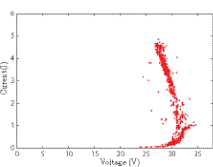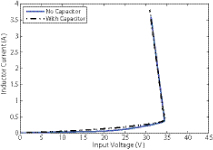Voltage-Offset Resistive Control for Photovoltaic Converters
Katherine A. Kim with adviser P.T. Krein
Providing clean energy from renewable energy sources is crucial as the world’s average energy consumption increases and carbon emissions become a major concern. Photovoltaic systems harness the sun’s energy and play an increasingly important part in today’s energy market. Their energy generation must be effective and reliable under sudden environmental variations. This research focuses on an inner-loop control, called voltage-offset resistive control (VRC), for dc-dc converters that has inherently low sensitivity to changes in solar irradiance. The VRC is used in conjunction with a maximum power point (MPP) tracking algorithm. Because the controller updates the control to the present MPP only periodically, total computational requirements are low. The control method can be implemented on a low-cost microprocessor to create an effective load-line on the PV panel that is a combination of constant voltage and resistive control. The load-line characteristics are defined by the offset-voltage Vos and the equivalent resistance Req. It was found that the daily moment of a solar panel’s MPP under a variety of weather conditions generally matches the VRC load-line with a negative Req value. An example of a clear day’s MPP movement is shown in Figure 44 along with the effective load-line for VRC with a Req =-1 Ω in Figure 45. The exact VRC parameters are adjusted periodically throughout the day to match the present conditions and ensure low-sensitivity control at the MPP.
This control has been implemented on an experimental PV system using a 175 W solar panel source and a boost converter connected to a dc-link. The system shows stable operation under VRC and adjusts quickly to the new operating power. The next steps of this research are to test a full VRC-MPPT control method over a variety of weather conditions and compare its performance to traditional MPPT methods.
This research is supported by the Grainger Center for Electric Machinery and Electromechanics, the National Science Foundation through the Graduate Research Fellowship Program, and the East Asian and Pacific Summer Institutes (EAPSI) program and the National Research Foundation of Korea through the EAPSI program.

